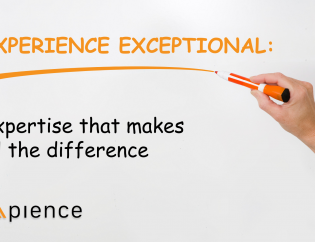The Trust Equation :
How Digital Trust Fuels Data Privacy
Written by:
Principal Consultant
Sapience Consulting
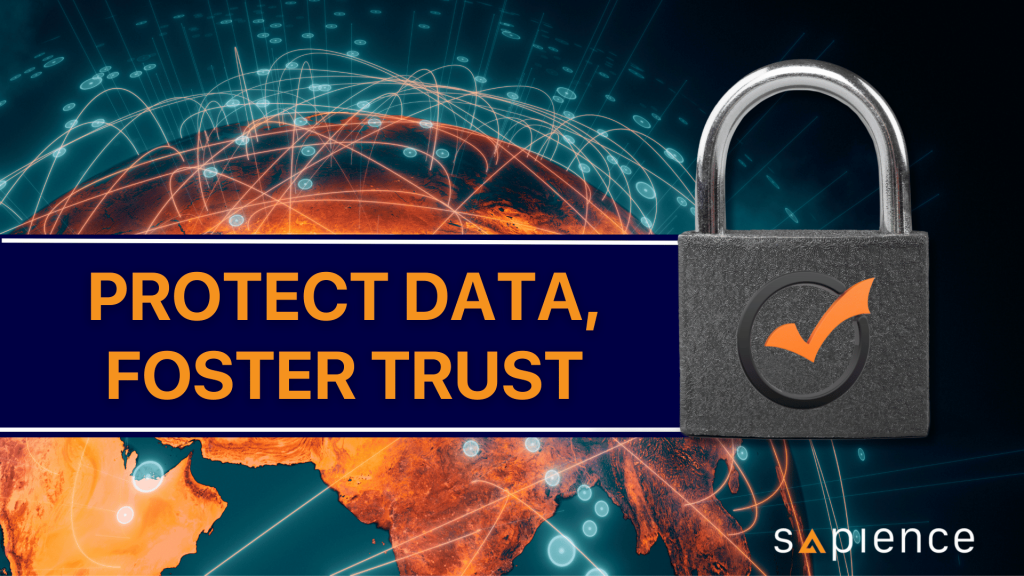
In today’s hyper-connected world, our digital lives are intricately woven into the fabric of the internet. Every click, search, and purchase generates a data footprint, leaving a trail of personal information in its wake. This constant exchange raises a crucial question: can we trust the companies and platforms we interact with to handle our data responsibly? The answer lies in the concept of digital trust – a cornerstone for promoting and protecting data privacy.
What is Digital Trust, and Why Does it Matter?
Digital trust goes beyond simple security measures. It encompasses the belief that the organisations we interact with online will act with our best interests in mind. This involves:
-
Transparency: Clear communication about how data is collected, used, and stored.
-
Security: Robust safeguards against data breaches and unauthorised access.
-
Accountability: Taking responsibility for data misuse and demonstrating a commitment to user privacy.
-
Respect: Understanding and valuing user privacy rights.
When digital trust is present, users feel comfortable sharing their data, knowing it will be handled ethically and responsibly. This fosters a more positive online experience – one where users are empowered and businesses can build stronger relationships with their customers.
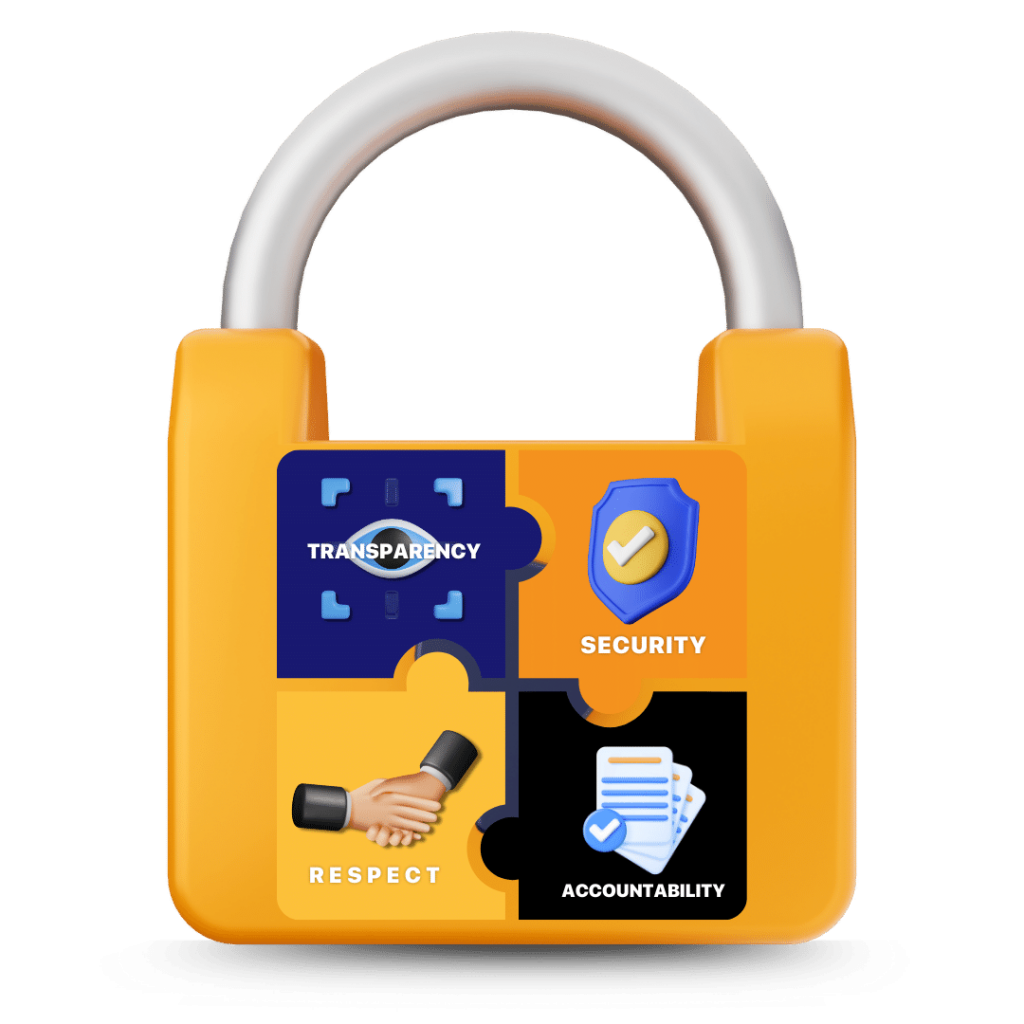
Transparency, Security, Respect & Accountability.
However, a lack of digital trust can be detrimental. Data breaches, privacy scandals, and opaque data practices erode user confidence, leading to:
Increased Scrutiny: Regulatory bodies may impose stricter data protection laws.
Consumer Apathy: Users become hesitant to share information, hindering innovation and personalisation.
Brand Damage: Public trust is easily shattered, leading to reputational harm for businesses.
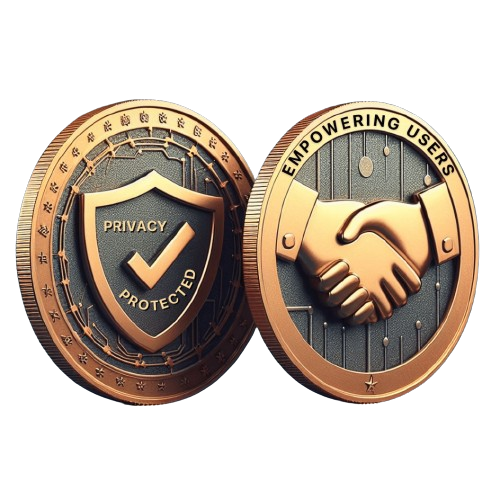
Strong data privacy practices are essential
for building trust with users.
The Data Privacy-Digital Trust Symbiosis
Data privacy and digital trust are intricately linked. Strong data privacy practices are essential for building trust. Here’s how:
Compliance with Regulations: Demonstrating adherence to data protection laws like GDPR (General Data Protection Regulation) and PDPA (Personal Data Protection Act) reassures users their information is handled legally.
Data Minimisation: Collecting only the data necessary for a specific purpose shows respect for user privacy and reduces the risk of exposure.
User Control: Providing options for users to access, rectify, and delete their data empowers them and fosters a sense of agency.
Conversely, a robust digital trust environment fosters better data privacy practices:
Transparency Breeds Consent: When users understand how their information is used, they’re more likely to provide informed consent.
Accountability Creates Responsibility: Knowing they’ll be held accountable for data misuse incentivises companies to prioritise privacy.
Building Loyalty through Respect: Respecting user privacy rights fosters brand loyalty and encourages long-term relationships.
Building a Culture of Digital Trust
In an age where data is the new currency, fostering digital trust is paramount. Here are some ways companies can build a culture of trust and promote data privacy:
-
Privacy-by-Design: Integrate data privacy considerations into the development of all products and services.
-
Clear and Accessible Privacy Policies: Use concise language and avoid legal jargon to ensure users understand their data rights.
-
Regular Communication: Be transparent about data practices and keep users informed of any changes through regular communication.
-
User-Friendly Privacy Controls: Empower users to manage their data settings with clear and accessible interfaces.
-
Investing in Security: Implement robust security measures to safeguard user data from breaches and unauthorised access.
-
Third-Party Vetting: Carefully vet third-party vendors to ensure they align with your commitment to data privacy.
-
Responding to Breaches Proactively: Have a clear incident response plan for data breaches and communicate openly with users in case of any issues.
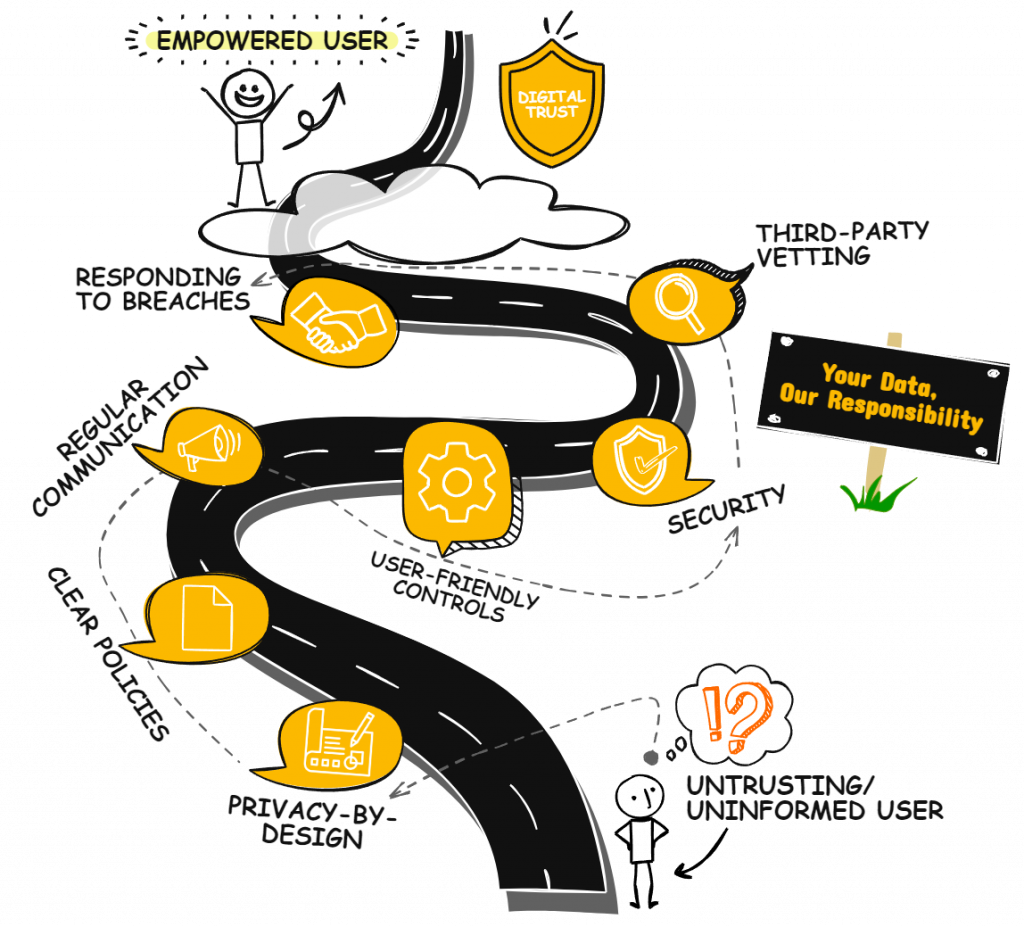
An Introduction to ISACA’s Digital Trust Ecosystem Framework (DTEF)
The digital world offers convenience, connection, and endless possibilities. But with every click and interaction, we entrust businesses with a piece of our digital selves – our data. In this environment, fostering trust is no longer a luxury; it’s a necessity.
ISACA, a global association for information systems professionals, recognises this critical need. Their innovative Digital Trust Ecosystem Framework (DTEF) empowers organisations to build and sustain trust in the digital age.
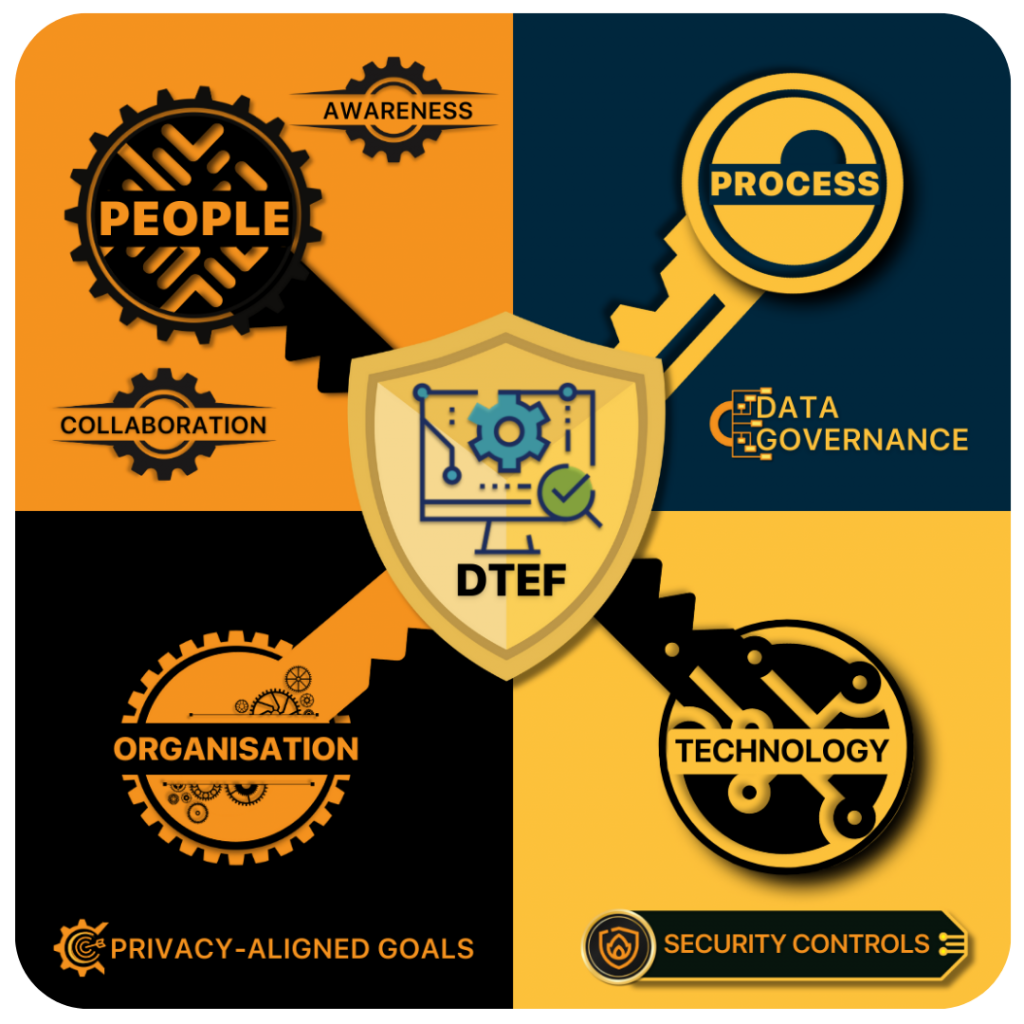
What is the DTEF?
The DTEF is a holistic framework that goes beyond technical security measures. It provides a comprehensive roadmap for organisations to establish a culture of digital trust. It considers four key pillars:
People: The human element is crucial. DTEF addresses factors like leadership commitment, employee awareness, and fostering a culture of ethical behavior.
Process: Robust processes are essential. The framework helps organisations develop clear data governance practices, risk management strategies, and incident response plans.
Technology: Technology plays a vital role. DTEF guides organisations in implementing appropriate security controls, data protection measures, and privacy-enhancing technologies.
Organisation: Culture matters. The framework emphasises aligning organisational goals with a commitment to digital trust and data privacy.
How Does the DTEF Help?
The DTEF offers a multitude of benefits for organisations, including:
Enhanced Data Privacy: By promoting responsible data practices, the framework helps organisations comply with data privacy regulations and minimise the risk of data breaches.
Improved Customer Relationships: Trust is the foundation of strong customer relationships. The DTEF helps build user confidence and loyalty by demonstrating a commitment to data privacy.
Reduced Risks and Costs: Data breaches can be devastating. The DTEF helps organisations proactively manage security risks and minimise the potential financial and reputational damage from data incidents.
Increased Innovation: A trusted environment fosters innovation. The DTEF empowers organisations to explore new technologies and data-driven strategies with confidence.
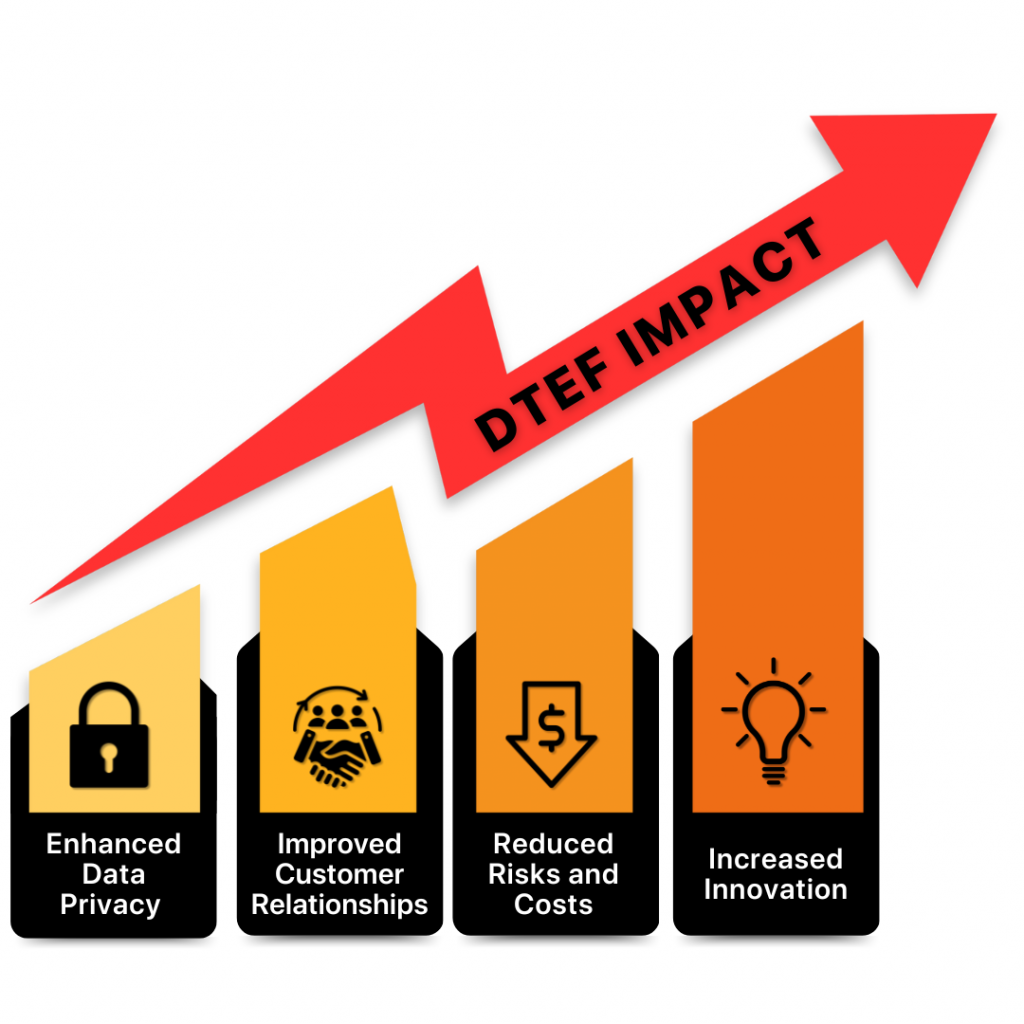
The DTEF: A Powerful Tool for Building a Trusted Future
In today’s digital landscape, trust is a competitive advantage.
Digital trust is not a destination; it’s an ongoing journey. By prioritising data privacy and actively building trust, businesses can create a more secure and empowering online environment for everyone. This requires not only strong data governance but also a shift in mindset – one that views user privacy not as a constraint but as a fundamental right and a competitive advantage.
Ultimately, the path to a more trusted digital future lies in fostering collaboration between businesses, regulators, and users. When all stakeholders work together to establish clear expectations, implement responsible data practices, and hold each other accountable, we can create a digital landscape where trust and privacy can flourish.
ISACA’s DTEF provides a valuable framework for organisations to navigate the complexities of data privacy and build a foundation for a more secure and trusted digital future. By exploring the DTEF further, organisations can gain a deeper understanding of its components and how to implement them to achieve their digital trust goals.
In Conclusion
Digital trust is the bedrock upon which a secure and thriving digital ecosystem is built. By prioritising data privacy and fostering a culture of respect for user information, we can create a more secure and empowering online experience for everyone. As we navigate the ever-evolving digital landscape, let’s remember that trust, like data, is a valuable asset. Let’s invest in it wisely, for the benefit of individuals, businesses, and the future of the internet itself.
Check out our IBF-approved courses! There is no better time to upskill than now!











